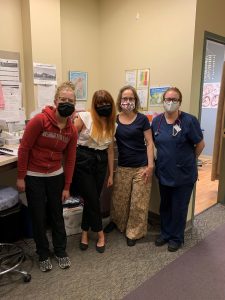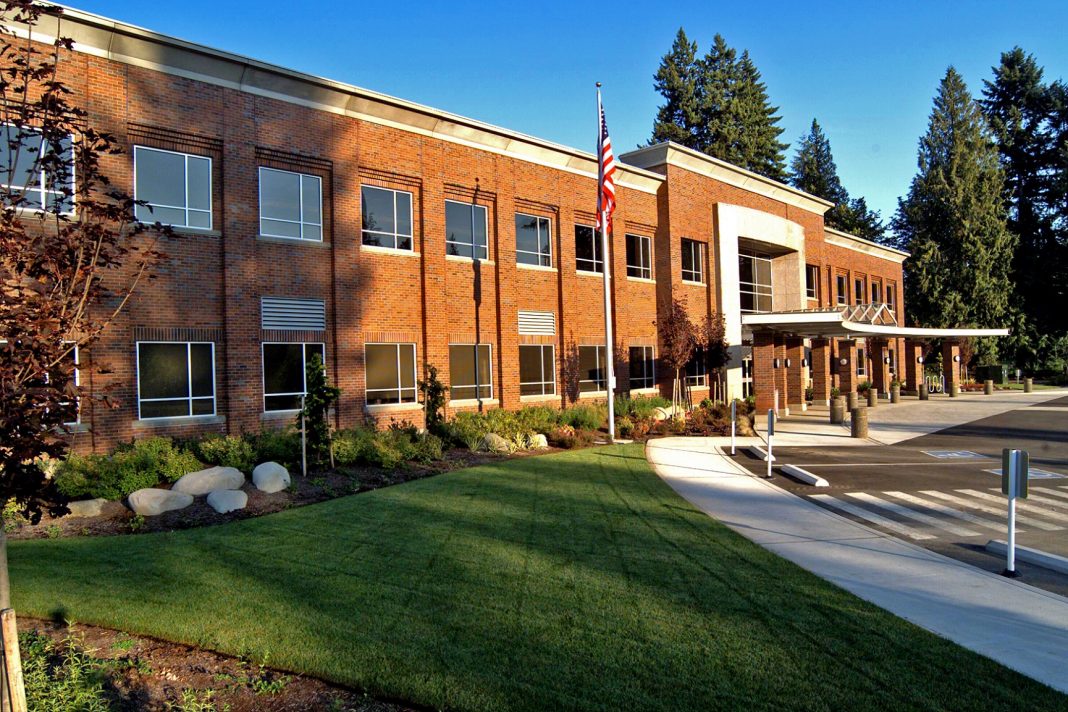Ladies, let’s face it. Trips to the OBGYN aren’t much fun. But whether for routine examination, pregnancy care or when problems arise, these caring individuals do their best to keep us strong and healthy. Locally, Olympia Obstetrics & Gynecology is one of the clinics with access to robotic surgery options which make procedures minimally invasive, extremely accurate and with significantly less down-time. If you need high risk care, their team is skilled and able to provide cutting edge treatment…literally.

Dr. Darrel Bell, a physician partner at Olympia Obstetrics & Gynecology and former Chair of Robotic Assisted Surgery for Providence Health and Services, explains that: “The use of robotics is surgeon-specific and not procedure-specific. In more complicated cases, robotics brings better visualization through 3D imaging and provide better dexterity for doctors.” That said, traditional laparoscopic technique works beautifully for 95% of our patients. All our experienced surgeons can walk patients through their options.
His colleague Dr. Laura Hanks agrees. Robotics offer: “Shorter recovery time, less blood loss and lower complication rates than with open surgery. It is a great option for complex cases, women with endometriosis or previous abdominal surgeries and women with a higher BMI.”
Bell and Hanks are two of the few local OB/GYN surgeons both trained on, and with access to, the two robotic units at Providence St. Peter Hospital. Bell explains that using it requires his eyes, hands, fingers and feet. “It’s full-body muscle memory,” he says, “not just your hands and eyes.” Surgeons are always in the same room as the patient throughout the procedure. They’re typically operating machinery from a few feet away but are in constant dialog with operating room staff and always in control. “I do joke,” he says, “that I’m going to push the hysterectomy button now, but no, procedures aren’t automated.”

Both Bell and Hanks agree that robotic surgery is best suited for cases of uterine fibroids, endometriosis management, ovarian cyst removal and hysterectomies. Bell explains that in traditional open surgery, blood loss is measured in cups. Thanks to robotics, they only need to measure in teaspoons. “Access to technology is a great benefit to our patients,” he says.
Training for this type of procedure is intense and ongoing. Hanks graduated from a residency program that focused many hours of learning on robotics and Bell received his lab training in California. Students in all programs begin by using plastic models and simulators before moving on to patients. Both attend frequent seminars, continuing education and online courses to keep fresh and current on trends and upgrades.
At the end of the day, however, robotics is just another tool. “We are a great group of caring providers who listen,” says Hanks.
Bell agrees. “The best tool is the one the surgeon is most comfortable with,” he says. So an open discussion of issues, medical history and ongoing symptoms is always step one.
That includes the ubiquitous COVID-19 and its impact on care. Hanks noted that fear of infection may lead many women to postpone treatment over the past year. But the clinic has maintained visits and important procedures as needed and will continue to do so however they can.
“We are a big family, and maybe none of us really understood what it means to be an ‘essential worker’ until now,” says Deb Cannon, practice manager at the clinic. “We have worked diligently to maintain a safe environment for everyone over the last year and will beyond the anniversary date of COVID. Medical care, whether for an annual exam, a birth control refill, a concern over abdominal pain or heavy unexpected bleeding, a pregnancy loss, or moving towards a delivery requires attention.”

“Medical maintenance items as well should come to the forefront of everyone’s to-do list, if not already there,” continues Cannon. “Olympia Obstetrics & Gynecology anticipates continuation of masking and social distancing until we have fast accurate testing and widely accepted and utilized vaccines. We look forward to the time when we can freely have visitors with patients in the clinic again.”
Whatever your reproductive health needs, clinic staff are there to help. They offer support for well women’s visits, infertility management, maternity, gynecological issues and menopausal care. To schedule an in-person or telehealth visit, simply call 360.413.8413 Monday through Friday between 8:00 a.m. and 5:00 p.m. After hours emergency care is available by calling 360.570.7602. Existing patients can also message the team through the patient portal.
No two people are the same and neither are their medical needs. But experience, technology and a caring heart mean that visits to Olympia Obstetrics & Gynecology will set your mind at ease.
Sponsored

















































